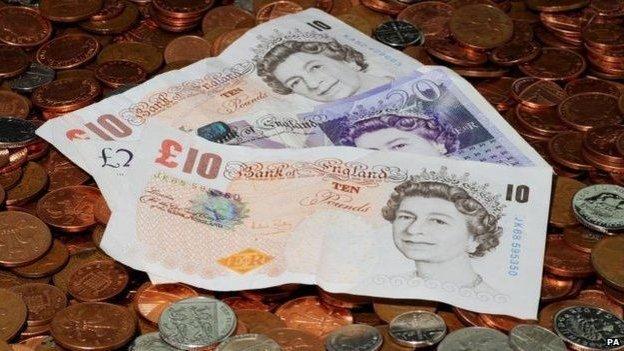Government legislates for £30bn of cuts or tax rises
- Published
- comments

In announcing new targets for reducing the deficit and debt as a share of national income in the next Parliament, have the Tories and Liberal Democrats put Labour on the spot or done the main opposition party a favour?
What they are proposing - and Parliament will vote on next year - is that the cyclically adjusted current budget should be in balance by 2017/18 and debt as share of GDP should be falling by 2016/17.
Just to remind you in case you have forgotten (surely not) the cyclically adjusted current budget is all spending on day-to-day items - such as civil servant salaries and welfare - adjusted to exclude payments that rise and fall with the economic cycle and also excluding investment (in roads, hospital buildings, and so on).
Now, as it happens, this law enshrines what the Office for Budget Responsibility, the government's forecasting arm, expects.
The OBR forecast ten days ago that debt as a percentage of GDP would peak in 2015/16 at 81.1%, and that the cyclically adjusted current budget would be in surplus to the tune of 0.7% of GDP in 2017/18.
Will Labour sign up?
But that doesn't mean these targets are undemanding.
The Treasury says that to meet these targets a new government would have to make additional tax rises or spending cuts of around £30bn - equivalent to 30% or so of the budget of NHS England.
Now this target is more demanding than Labour's current plan - that is, to see debt falling as a share of GDP and a balanced unadjusted current budget by 2019/20 at the latest.
Would it therefore be difficult for Labour to sign up for these new legislated targets, the new fiscal targets? Will Labour vote for the new targets?
Risk
I expect Labour probably will vote with the Tories and LibDems. Why?
Because it would shoot the Tories' and LibDems' main pre-election fox, namely that Labour won't be tough enough on mending the public finances.
Note that even if Labour does sign up to balance the cyclically adjusted current budget in three years and reduce debt as a share of national income in two years, it will still have £50bn more to spend than the Tories by £2019/20 - because the Tories want a big surplus on the overall budget, including investment spending by then (see The £50bn gap between Tories and Labour).
So the risk for the Tories and LibDems is that their new Charter for Budget Responsibility would make a Labour government more credible as a prudent steward of the public finances, while still giving Labour plenty of scope to cut less than the Tories.
Update: 16.18 GMT
So, I have had it confirmed that Labour will vote for the updated Charter for Budget Responsibility.
An excited senior member of the party said to me: "It's even worse for them than we thought. They have downgraded the goals from a target to an aim. And it's a rolling three-year target. Good grief."
Or to put it another way, Labour is delighted to vote for a law that might make voters more confident the party is to be trusted as steward of the public finances, but doesn't appear to bind its hand in a severe way.
Further update: 16.36 GMT
The Tory Treasury makes the perfectly reasonable point that Labour deciding to vote for the updated Charter for Budget Responsibility does modify its fiscal position.
"They have changed the core of their economic policy in the space of a few days," said a senior Tory official - adding that surely this would impair its credibility.
Except that voters may care more that Labour is limiting its scope to tax and spend by backing the new debt and deficit objectives.